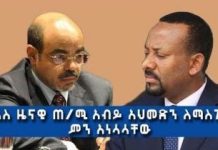The people of the Republic of Somaliland overwhelmingly voted for a constitution in 2001 referendum. All laws and policies are subsidiary to that Constitution and shall conform. Considering the constitutional principles as key and vital for Waddani Patriotic Party policies, we hereby issue this position paper to clarify in detail the Waddani Government policy on the media.
Since the declaration of independence of Somaliland, there have been skirmishes between different Somaliland Governments and the growing media sector. Despite series of attempts made to resolve the problem, no durable solution was reached over the years. The main weakness of these efforts has been its failure to address the root causes of the problem. on the one hand, there is a Constitution that fully guarantees freedom of media and freedom of expression in general. On the other hand, the old culture and laws of Siad Barre regime continue to be applied in Somaliland.
The conflict between the constitutional principles based on the international democratic standards and the use of outdated laws remains to pose a serious obstacle to media development. Journalists are arrested and prosecuted according to the Penal Law. Media houses are banned or suspended indefinitely. Such actions not only violate the basic rights and freedoms of journalists, but also harm the good image of Somaliland as a vibrant democratic state.
The existing Press Act (Law No. 27/2004) does not cover radios, televisions and the online media. The shortcomings in the Law is one of the hindrances and sources of tensions. Although the illiteracy is high in Somaliland, there is only one radio in Somaliland – Radio Hargeisa. Therefore, the legal gaps need to be fully addressed.
There are also undeniable concerns on the ethics and professionalism of some journalists. There is no single university or college that teaches journalism in the entire country. The short training courses provided by certain institutions are overwhelmed by the huge demand generated by the growing Somaliland democratic culture. Additionally, there are no written or formal mechanisms in which aggrieved persons can complain against journalists.
Cognizant of the complexity of the issues at hand, and committed to provide long-lasting solutions, the Waddani party policy is to take a holistic approach to address the above challenges. Therefore, the Waddani government, when elected, will take appropriate action to tackle the matter. Its responses will be based on a fully inclusive and transparent consultative process, which will involve following stakeholders: the media houses and journalists, the academia and media activists, the civil society, the Somaliland business and civic community, the public and relevant international sources as well as key Government sectors. As already declared in the Waddani party’s 19-22 October 2016 Central Committee Meeting, and is clearly and emphatically stated in its approved Political Program, the Waddani party favours to decriminalize media cases and the application of the civil law. Pursuant to above consultative process, it intends to develop a comprehensive Media Law that addresses all the pertinent media issues including mechanisms to address complaints and to liberalize certification matters.
The Waddani government will cooperate with national universities to establish journalism faculties. The government will support the initiative, encourage internal and external contributions and will extend full and unequivocal backing to ensure the success of such an endeavor. Furthermore, recognizing the financial difficulties faced by many journalists and media houses to develop their capacities, a Waddani government will work with all stakeholders to provide competitive scholarship programmes to the working journalists who cannot afford to pay university fees.
____________________________
Abdirashid Mohamed Adam (Jeeni)
Deputy Secretary of Information
The Waddani Pary






























